Caragh M. O'Brien
Series:
1 - Birthmarked (ISBN: 9781429922654)
1.5 - Tortured (ASIN: B00633W62I)
2 - Prized (ISBN: 9781596435704)
2.5 - Ruled (ISBN: 9781466828933)
3 - Promised (ISBN: 9781596435711)
Summaries via: Goodreads
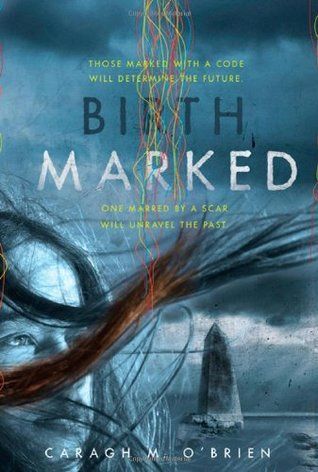 Birthmarked
BirthmarkedIn the future, in a world baked dry by the harsh sun, there are those who live inside the walled Enclave and those, like sixteen-year-old Gaia Stone, who live outside. Following in her mother's footsteps Gaia has become a midwife, delivering babies in the world outside the wall and handing a quota over to be "advanced" into the privileged society of the Enclave. Gaia has always believed this is her duty, until the night her mother and father are arrested by the very people they so loyally serve. Now Gaia is forced to question everything she has been taught, but her choice is simple: enter the world of the Enclave to rescue her parents, or die trying.
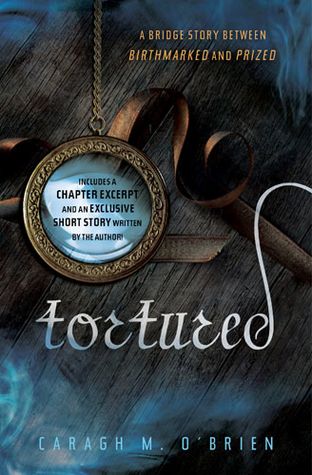 Tortured
Tortured"But what about Leon?" Now, in this new story that bridges the gap between Birthmarked and Prized, Caragh M. O'Brien answers her readers' most common question with a tale of suffering and determination from Leon's perspective. Be warned. The story is a spoiler for the first book in the award-winning trilogy. This promotional e-book includes this exclusive bridge story, as well as a teaser chapter for Prized, book two in the Birthmarked trilogy, available wherever e-books are sold November 2011.
Currently Available for FREE on
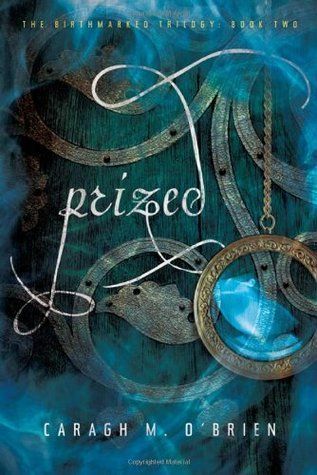 Prized
PrizedStriking out into the wasteland with nothing but her baby sister, a handful of supplies, and a rumor to guide her, sixteen-year-old midwife Gaia Stone survives, only to be captured by the people of Sylum, a dystopian society where women rule the men who drastically outnumber them, and a kiss is a crime. In order to see her sister again, Gaia must submit to their strict social code and the oppressive rules of Matrarc Olivia. Meanwhile, two brothers claim her attention as they attempt to understand the environmental trap that keeps the people of Sylum captive, and suddenly Gaia must contend with the exciting, uncomfortable, and altogether new feeling of being desired.
But when someone from her past shows up, Gaia discovers that survival alone is not enough and that justice requires sacrifice.
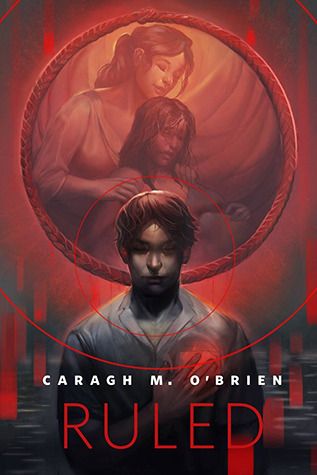 Ruled
Ruled The bracelet sits in his pocket, patiently waiting to be slipped around Gaia’s wrist. Leon needs to see her again. He finds out that Gaia is delivering a baby in the village, and he makes the trip to visit the sixteen-year-old midwife—only to find that the birth is not going too well. The bracelet—and what it means to the both of them—will have to wait.
This short story takes place during the time between the second book in the Birthmarked trilogy (Prized) and the final book (Promised) and offers a rare glimpse into the mind and heart of Leon Grey.
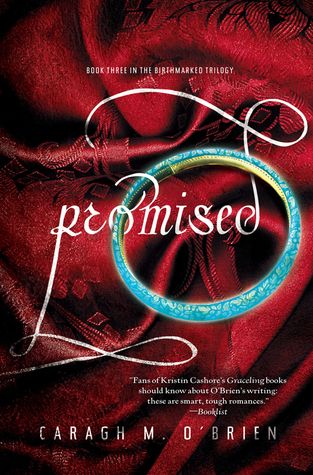 Promised
PromisedAfter defying the ruthless Enclave, surviving the wasteland, and overthrowing Sylum, Gaia Stone now faces her greatest challenge yet--to lead the people of Sylum back to the Enclave and persuade the Protectorat to grant them refuge. But in Gaia's absence, the Enclave has become even more ruthless, picking girls from outside the wall to serve in an experimental baby factory. Babies with the right genes are now a priceless commodity with the potential to reshape life inside the wall and redefine humanity. The key to it all comes back to one fearless, young midwife. When negotiations devolve into terrorist threats, Gaia finds herself at the crux of an insupportable decision.
As a leader, a woman, and an idealist in love, Gaia must decide if she can sacrifice what--or whom--she values most.
Review:
I went into this series expecting the same old drivel we have come to know as YA dystopian fiction, happily I was surprised. The themes in this story are quite on point when we speak about people's rights bridging this topic across gender rights, to parental rights to caste systems. These are the themes that really gripped me. They were extremely well developed, much more so than one would expect in YA fiction.
The first part of the trilogy, we are focused on a patriarchal society with strict caste systems. The elite exist in the Enclave and the serfs exist outside the Wall. The main character is a teen-aged midwife whom according to their society must take the first three babies from the mothers she assists and "advance" them to the Enclave. Do not worry this isn't Soylent Green. They are "advanced" to join the elite families. We see how this theme comes into play when Gaia must "advance" her first baby. This scene was emotional and heart wrenching but almost fell flat for me. As a new mother, you would have to kill me before taking my child. And while the mother was sufficiently upset, I felt like Gaia got away too easily. I suppose that goes to show just how downtrodden these women were.
Personally, I was not very fond of the characters. I found them flat and wanting of a metaphorical burger. The only character who gained any depth was the main character, Gaia. The other characters went through various hardships which increased their interest for me but they just didn't do anything that made them special to me. I presume this was to keep the story focused around Gaia Stone and the issues she becomes aware of. To name a few of the issues that you see in this first book and carried through to the end:
- Genetic diversity
- Parental rights
- Medical care
- Societal responsibility
- Resource management
- Environmentalism
- Caste Systems
- Government Corruption
- Big Brother/Eye in the Sky
While she started out trying to save her parents (like so many stories of this ilk), it becomes about these issues. Her soul purpose I feel is to humanize the issues for us by coming into contact with the various, yet plain characters in situations where these issues rule their lives.
To conclude the first installment of this trilogy, Gaia ends up in the Wasteland on a veritable suicide mission. Do not fret this is not really a spoiler as we all knew this was going to happen. What I really appreciated is that this book can stand alone! The additional books are great but if you found out you didn't really like this trilogy you don't feel like you HAVE to read it to the end. I found it incredibly satisfying.
Tortured picks up where we left off in Birthmarked but from a different point of view, Leon's.I feel like this bridge story was good except that it was exceptionally short. The one thing I really didn't like is that the other promotional material after this story was larger than the story itself! Story-wise, I really did enjoy getting the perspective of Leon. Personally, I feel like we missed out learning more about the Protectorat, his staff and his family. Granted torture is really horrible but I would have liked to see if his Stepmother/Mother, Genevieve came to him before finally helping him. Whether his siblings ever tried to help. I also eventually would love to see more from Myrna Silk. She has such potential to be an amazing character. Overall, very enjoyable and currently available for free on Amazon!
In the second part of this trilogy, Prized, leads us into a matriarchal society! I was really excited about this because so often we hear of patriarchal societies in fiction going bad it was interesting to see the flip side. There are many parallels to the society of the Enclave, probably because that is our judgement point. Just like in the first story we have a leader that is out of control. Gaia, of course, can't help herself and blows up their society through her lack of integration. This is a double edged sword as far as I am concerned because it is through her lack of respecting their society she causes many incidents. While many of these incidents were good in that they had to happen for the story not only to progress but also to discuss the various issues, they didn't have to happen that way. If she had even a slight respect for the new society, she would have been less careless, and caused less harm. This book in particular shows how while most YA fiction has a coming of age story, this one doesn't. Although Gaia does become older and goes on to take on responsible roles. I do not feel as if she has really grown. It's more of a by accident or happen stance that she progresses at all. There are a few exceptions to this thought, such as the baby she saves in the first book, but there aren't many. There are many more parts of this story that show she is the same from beginning to end, such as her interactions with Leon and her other beaus.
The second bridge story really brings the romance in this trilogy to the front. I loved how Leon came to love Gaia in a more complete adult way. However this also shows Gaia's immaturity when you view her actions in their relationship. I feel like her most adult action in their relationship is to not agree to marry him right away. She shows she isn't ready over and over again. This story though shows that Leon definitely is getting there. This story was much more enjoyable than the other bridge story. However this one has the same problem, the promotional materials are longer than the story. I like this story more for the fact that it feels more complete.
To conclude this trilogy we have the matriarchal society joining the patriarchal society which are both dying out from lack of genetic diversity. For the patriarchal society, this is due to the age old problem of the pigs being more equal than the other farm animals (See Animal Farm). The Enclave sees themselves as high above those outside the wall and backed themselves into a genetic oubliette. Their answer is to increase the children coming in from outside the Wall. For the matriarchal society, this comes from environmental contamination and strict social roles that require "perfect" families. They backed themselves into dying out through fear of change and the accepting that they were just going to die out. After many, many more confrontations and conflicts they do merge as a complete society and our enemies get their comeuppance which is great. There was one particularly dreadful part of this book just before the end that will haunt me forever. As you get to the end you will immediately know to that which I speak. For the person going into reading this, be prepared and don't eat anything while reading the very end. I frequently had to put the book down to deal with my own reaction. Once that scene was over we finally get our happily ever after/beginning.
 Overall this story gains a four rating not for its characters, but for its story telling and gripping themes. The style, themes, and feel remind me directly of The Handmaiden's Tale by Margaret Atwood. In fact, I would treat this trilogy as a companion to Ms. Atwood's book as many of the themes were similar in both. I found that this trilogy focused on so many issues in complex ways was fantastic, but I fear I am noticing a new trend in YA fiction. I fear YA fiction may be moving away from dense multi-dimensional characters with great plots and themes to a series of transparent characters that are disposable stand-ins for displaying themes and opening a discussion of issues. The lack of depth in the characters really made the last book of this trilogy a struggle to complete. Not because it wasn't good, it just wasn't emotionally rich enough to keep me wanting more. Even that scene to which I spoke, wasn't as emotional for the character as I feel it should have been. Looking back, I can say that I certainly felt enough for both the character and myself for that scene! All together this trilogy is definitely worth reading and even more so if you are part of a book club or have an interest in human rights. These themes will give you ideas and you will want to talk/debate them out. Happy reading!
Overall this story gains a four rating not for its characters, but for its story telling and gripping themes. The style, themes, and feel remind me directly of The Handmaiden's Tale by Margaret Atwood. In fact, I would treat this trilogy as a companion to Ms. Atwood's book as many of the themes were similar in both. I found that this trilogy focused on so many issues in complex ways was fantastic, but I fear I am noticing a new trend in YA fiction. I fear YA fiction may be moving away from dense multi-dimensional characters with great plots and themes to a series of transparent characters that are disposable stand-ins for displaying themes and opening a discussion of issues. The lack of depth in the characters really made the last book of this trilogy a struggle to complete. Not because it wasn't good, it just wasn't emotionally rich enough to keep me wanting more. Even that scene to which I spoke, wasn't as emotional for the character as I feel it should have been. Looking back, I can say that I certainly felt enough for both the character and myself for that scene! All together this trilogy is definitely worth reading and even more so if you are part of a book club or have an interest in human rights. These themes will give you ideas and you will want to talk/debate them out. Happy reading!
1 comment:
Great review!!! Sounds like this series is right up my ally!
Post a Comment